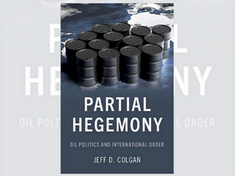-
New Security Broadcast | Jeff Colgan on Oil Politics and International Order
April 1, 2022 By Claire Doyle Debates around whether and to what extent international order is changing can be misguided “so long as we are thinking about international order as a single, monolithic thing,” says Jeff Colgan, Associate Professor of Political Science and director of the Climate Solutions Lab at Brown University in this week’s episode of New Security Broadcast. Colgan spoke at a recent Wilson Center event featuring his new book, Partial Hegemony: Oil Politics and International Order. In the book, Colgan challenges the idea of a monolithic ‘global order’ and shows that international order instead comprises a set of interlinked “subsystems.” In a world where there is no single, all-encompassing hegemon to trigger universal global change, this framework of subsystems allows us to explore how particular geopolitical realms can alter without fundamentally changing the geopolitical landscape, he says.
Debates around whether and to what extent international order is changing can be misguided “so long as we are thinking about international order as a single, monolithic thing,” says Jeff Colgan, Associate Professor of Political Science and director of the Climate Solutions Lab at Brown University in this week’s episode of New Security Broadcast. Colgan spoke at a recent Wilson Center event featuring his new book, Partial Hegemony: Oil Politics and International Order. In the book, Colgan challenges the idea of a monolithic ‘global order’ and shows that international order instead comprises a set of interlinked “subsystems.” In a world where there is no single, all-encompassing hegemon to trigger universal global change, this framework of subsystems allows us to explore how particular geopolitical realms can alter without fundamentally changing the geopolitical landscape, he says.Debates around whether and to what extent international order is changing can be misguided “so long as we are thinking about international order as a single, monolithic thing,” says Jeff Colgan, Associate Professor of Political Science and director of the Climate Solutions Lab at Brown University, in this week’s episode of New Security Broadcast. Colgan spoke at a recent Wilson Center event featuring his new book, Partial Hegemony: Oil Politics and International Order. In the book, Colgan challenges the idea of a monolithic ‘global order’ and shows that international order instead comprises a set of interlinked “subsystems.” In a world where there is no single, all-encompassing hegemon to trigger universal global change, this framework of subsystems allows us to explore how particular geopolitical realms can alter without fundamentally changing the geopolitical landscape, he says.
In 1973, the world experienced the largest peaceful transfer of wealth across borders in all of human history. “Up until that point,” says Colgan, “a group of international oil companies known as the Seven Sisters controlled the vast majority of the world’s oil reserves and production. And that gave them enormous power over countries like Iran and Venezuela.” OPEC formed as a direct response to this concentration of control, helping its member countries confront some of the most powerful companies in the world at the time. “It was a huge shift in international order that reverberated for years afterwards.”
But understanding shifts in global order like this one requires revisiting common perspectives on international governing arrangements. Most people conceptualize hegemony as an on-off switch, Colgan says. They think that if you are the hegemon, then you dominate across “all dimensions of power—you’re dominant militarily, you’re the biggest economy, you’re the leading technological state, you control natural resource flows, capital flows, information.” That is not how global power currently operates, however. “In reality, of course, a state could lead in some of these dimensions, but not all of them.” It is this state of partial hegemony that describes today’s world, he says.
The aim of Partial Hegemony, Colgan says, “is to help us remember that international governing arrangements only work under some conditions, so we need to learn about what those conditions are.” Shedding light on these arrangements is an integrative process. Particular issue areas like oil and its geopolitical history, he says, can be a jumping-off point for broader discussions of international relations theory, which in turn can deepen our understanding of other systems within the world order.
New Security Broadcast is also available for download on iTunes and Google Podcasts.
Photo Credit: Book cover of the book, Partial Hegemony: Oil Politics and International Order, courtesy of Jeff Colgan.
 A Publication of the Stimson Center.
A Publication of the Stimson Center.

 Debates around whether and to what extent international order is changing can be misguided “so long as we are thinking about international order as a single, monolithic thing,” says Jeff Colgan, Associate Professor of Political Science and director of the Climate Solutions Lab at Brown University in this week’s episode of New Security Broadcast. Colgan spoke at a recent Wilson Center
Debates around whether and to what extent international order is changing can be misguided “so long as we are thinking about international order as a single, monolithic thing,” says Jeff Colgan, Associate Professor of Political Science and director of the Climate Solutions Lab at Brown University in this week’s episode of New Security Broadcast. Colgan spoke at a recent Wilson Center 

